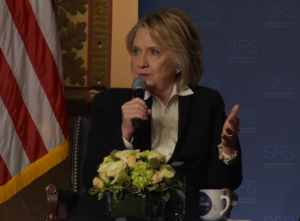The United States must engage more with the global community to rebuild weakening alliances with regions such as Europe and Asia, former Secretary of State Hillary Clinton said at an event in Gaston Hall on Wednesday.
Throughout her speech, Clinton said that President Donald Trump’s administration’s decision to backtrack on previous deals and negotiations has strained relationships with other countries, putting the U.S. reputation at risk.
“At some point, as another nation, you think, ‘Can we trust them?’ It’s not just administration to administration, it’s the United States of America, it’s our government. It’s about giving our word, it’s about following through,” Clinton said. “I think we have to be smarter about how we sustain our involvements and commitments going forward.”

Clinton’s speech was a part of the “Future of Diplomacy” symposium hosted by the Georgetown Institute of Politics and Public Service at the McCourt School of Public Policy and the School of Foreign Service as a part of the Lloyd George Centennial Lectures, which began February 2018 to celebrate the upcoming SFS centennial anniversary. Clinton’s keynote was moderated by Bill Burns, former U.S. ambassador to Russia and U.S. deputy secretary of state.
Clinton’s keynote marks her third return to Georgetown since she lost her bid for the 2016 presidential election. In her 2017 and 2018 appearances, Clinton presented the annual Hillary Rodham Clinton Awards for Advancing Women in Peace and Security, which honor the peace-building work and empowerment efforts of recipients.
During a time when there is a lack of satisfaction with both the U.S. government and the governments of numerous European countries, there is a strong need for alliances between the two regions, Clinton said.
“Democracy is going through some growing pains. We are going through some growing pains, and so are the Europeans,” Clinton said. “When that happens we need our friends. We need people who we have worked with and counted on, and I think the division that is being unfortunately driven between the United States and Europe is going to haunt us.”
Trump threatened that the United States would withdraw from the North Atlantic Treaty Organization, a military alliance of 29 countries in North America and Europe, if allies resisted his demands for additional military spending at the NATO summit meeting last July. Over the course of 2018, Trump told senior administration officials multiple times that he wanted to withdraw from the alliance, according to The New York Times.
Clinton warned against the Trump administration’s rhetoric on NATO, which puts the longstanding alliance between the United States and Europe at risk.
“When you look at what is happening in Europe, it should be a great concern to any American,” Clinton said. “The fact that our current administration is almost egging on the breakup of NATO and to be in a hostile relationship with people who share a lot of our values who we have gone through a lot with, strikes me as counterproductive, and as I said, essentially dangerous.”
The United States is not only neglecting its European allies, but is also allowing its allies in Asia and the developing world to falter, according to Clinton.
For the United States to repair weakening relationships in Asia, it must refocus attention to restore balance in a way that includes long-term U.S. engagement, according to Clinton.
“We are not doing everything we should to have this kind of balance that I think we need,” Clinton said. “We talked about pivoting to Asia, to rebalance, but all of this means that you got to stay engaged for the long run, not just sporadically.”
A lack of U.S. involvement across Asia, Latin America and Africa has allowed China to become a frontrunner in influencing these regions, Clinton said.
“We are losing the influence contest to China,” Clinton said. “They are engaged in an enormous amount of cultural diplomacy, of funding projects in Latin America, in Africa and elsewhere, and we are not competing.”
Clinton specifically noted that Beijing’s “Belt and Road Initiative” is enjoying a growing influence in global politics. Also known as “One Belt, One Road,” the initiative is a strategy by the Chinese government to develop infrastructure and investments across four continents, linking China to the nations of Southeast Asia, the Gulf countries and North Africa.
Maintaining developmental and financial aid in Central American countries could not only improve diplomatic ties with countries such as Guatemala, El Salvador and Honduras, but also help decrease the effects of drug trafficking in the region, Clinton said.
“If we spent even a relatively minor amount of money of the federal government’s budget in Guatemala, El Salvador and Honduras, dealing with some of their problems and working against corruption, then all of this talk about poor, desperate people fleeing gang violence and drug traffickers would change into a different conversation,” Clinton said.
The Trump administration pushed to end a humanitarian program that was enacted in 2001 following the devastating earthquakes in El Salvador and allowed Salvadorans to live and work legally in the United States. However, an injunction from the U.S. District Court for the Northern District of California in Oct. 2018 blocked the Department of Homeland Security from implementing and enforcing Trump’s plan.
Clinton remains optimistic, however, that young people who engage in careers in public service can both help shape the future and reassert the importance of supporting diplomacy.
“There’s a lot of hard work that has to be done, but there’s also a lot of room for imagination,” Clinton said. “It’s one of the most exciting times to be looking at a career in public service. I would hope that what we’ve done today will lead to an even longer conversation so that even more students will understand the importance of supporting diplomacy.”
This article was updated Feb. 12.




















